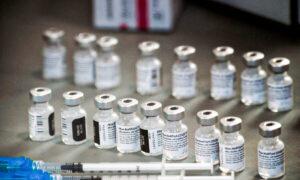Insured Americans are being charged more than $100 for the newly rolled-out COVID-19 vaccines as insurers fail to update their plans, with some people deciding against taking the jab after learning about the cost.
Glen Cote from Acton, Massachusetts, received a text on his phone saying that his COVID-19 shot would cost $190.99, according to WBZ-TV. The message came just before his appointment at retail pharmacy chain CVS to receive the new vaccine. Mr. Cote, who’s covered by the state Medicaid program MassHealth, went on to cancel the appointment.
According to the Centers for Medicare and Medicaid Services (CMS) and CVS, the new COVID-19 vaccines have a revised billing code for insurers, which the firms are yet to update for their plans. That’s led to many people being wrongfully charged for the shot.
“The new vaccine formulations mark the first time that the COVID-19 vaccines are available without being purchased/distributed by the federal government,” the statement reads, according to The Hill.
The initiative “provides no-cost COVID-19 vaccines to adults without health insurance and adults whose insurance does not cover all COVID-19 vaccine costs. No-cost COVID-19 vaccines through this program will be available until December 31, 2024.”
The CDC estimates that there are 25 million to 30 million U.S. adults without health insurance.
Speaking to reporters on Sept. 20, Health and Human Services Secretary Xavier Becerra said that the Bridge Access Program is “a billion-plus dollar program” and pointed out that the CDC will be paying a similar price for the vaccine as it did in the past.
During the first round of vaccinations, the federal government had paid $20 per dose. The new vaccines on the commercial market exceed $100 a dose, with Pfizer charging $120 and Moderna charging $129 per shot.
Vaccine Risks
The new COVID-19 vaccines from Pfizer and Moderna were approved by the U.S. Food and Drug Administration (FDA) on Sept. 11, with the shots made available for use among U.S. residents as young as 6 months old.Dr. Peter Marks, a top FDA official, has insisted that vaccination is “critical” for protecting against COVID-19 hospitalization and death.
However, many critics, including experts, have come forth with recommendations advising against taking the vaccine.
“Based on the high rate of global immunity and currently available data, the State Surgeon General recommends against the COVID-19 booster for individuals under 65. Individuals 65 and older should discuss this information with their health care provider, including potential concerns outlined in this guidance.”
The department pointed out that mRNA vaccines pose a risk of clinical myocarditis and cardiovascular issues among “otherwise healthy individuals” and that there’s an “unknown risk of potential adverse impacts” with each additional shot of mRNA COVID-19 vaccines.
The spike protein in these vaccines may persist among some individuals “for an indefinite period of time,” posing health risks.
The department noted that several studies have found mRNA COVID-19 vaccines to be associated with “negative effectiveness” after four to six months.
“As efficacy waned, studies showed that COVID-19-vaccinated individuals developed an increased risk for infection. This is not found in other vaccines, including the flu vaccine.”
Children ages 6 months to 4 years old are supposed to receive three shots of the Pfizer-BioNTech vaccine. The dosage was increased from two shots when early testing showed little effectiveness.
Three doses of the Pfizer vaccine provided little protection against emergency room visits, urgent care encounters, or outpatient visits, according to the new study.
Pfizer’s vaccine was authorized for children despite unreliable efficacy estimates against infection, and no efficacy estimates against severe disease.


